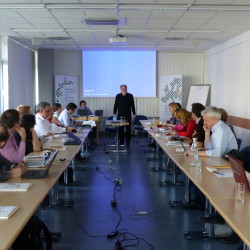Members of the BES Scientific Leadership Team participated in a workshop at the MZES, University of Mannheim, March 28-29, 2014.
Twitter and Facebook are now widely used forums of social communication. Many people use them for all sorts of purposes, among them the collection of political information, the expression of political attitudes, and the co-ordination of political action. This is where these forums of social communication are gaining relevance for students of politics, prominent among them members of National Election Studies. It was this latter group of researchers which convened in Mannheim end of March to exchange their approaches to and findings regarding the relevance of social media communication for electoral research (and political participation more broadly). Convened by Sebastian Popa (Mannheim and Budapest) and Hermann Schmitt (Manchester and Mannheim), 25 scholars from all over Europe met for two half days of work (and a nice conference dinner). The workshop also intended to bring political scientists (those who ask the relevant research questions) and computer scientists (those who retrieve and analyse the data) together with the hope of cross-fertilisation of these related strands of research.
Many election studies are now interested in analysing social media communication data as one part of their analytical repertoire, and add resulting findings to their increasingly complex election study data base. A number of NES representatives participated, next to the British Election Study (represented by Gibson, Green, and Schmitt) also the German GLES (Jungherr, Wolf et al.), the Italian ITANES (represented by Valeriani), the Danish study (Klemmensen)and the European Election Study (EES, Braun, Popa, and Schmitt). From the side of data providers, TNS Opinion from Brussels (Chellala and Parnet) and GESIS (Kaczmirek and Mayr) reported on their activities and findings. Moreover, two outstanding scholars in the field (Barbera and Benoit) participated virtually by way of a teleconference.

